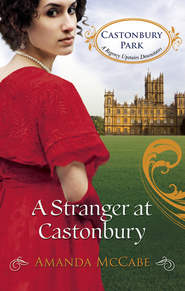По всем вопросам обращайтесь на: info@litportal.ru
(©) 2003-2025.
✖
Shipwrecked and Seduced
Настройки чтения
Размер шрифта
Высота строк
Поля
Shipwrecked and Seduced
Amanda McCabe
Maria Gonzales had hoped for a fresh start in the New World as a contessa’s servant, far away from her old life as a tavern maid in Seville.That hope is shattered when a storm destroys the ship off the coast of Hispaniola. The lone survivor, Maria sees no harm in pretending to be the contessa and enjoying a little luxury for once in her life. . . especially if it brings her closer to the irresistibly attractive governor’s aid, Carlos de Alameda.Dedicated to his career and to regaining his family’s honor, Carlos has gone too long without the comforts of a woman. He instantly feels a powerful connection to the beautiful young survivor…and an overwhelming lust.Yet he also harbors suspicions about the contessa. First he will explore her body. . . then he’ll uncover the truth. . .
Author Note
I’m so excited to be given the chance to be part of the Mills & Boon Undone! Ebook launch! Not only do I get to try a whole new (new to me, anyway!) format, I get to revisit a setting and a group of characters I love. High Seas Stowaway, coming soon from Mills & Boon Historical, is the story of Balthazar Grattiano, a ship’s captain sailing the treasure-laden waters of the Caribbean in 1535, and Bianca Simonetti, the owner of a tavern in the Spanish island town of Santo Domingo. They share a secret past—but it’s the present that proves even more dangerous! Love, passion, peril—all with white sand beaches, turquoise waters, and warm sun. Of course I wanted to go back there!
One of the characters we meet in High Seas Stowaway is Carlos de Alameda, a handsome, mysterious Spanish nobleman. I wanted to know more about him, about his story—and about the kind of woman who could uncover all that delicious inscrutability. I think I found her in Maria, a woman with plenty of mysteries of her own. I hope you enjoy their tale, too!
The history of the early Spanish Caribbean is a fascinating one. I had so much fun researching these two stories (and touring recreations of Renaissance ships!). A few interesting sources are: Kenneth Andrews’ The Spanish Caribbean: Trade and Plunder; CH Haring’s The Spanish Empire in America; Carl Sauer’s The Early Spanish Main; Marcus Rediker’s Villains of All Nations; and Wayne Curtis’s And a Bottle of Rum: A History of the New World in Ten Cocktails. (Because, as anyone who has seen Pirates of the Caribbean can attest, what’s the Caribbean without some rum? And some sexy pirates!)
Amanda McCabe wrote her first romance at the age of sixteen - a vast epic starring all her friends as the characters, written secretly during algebra class. She's never since used algebra, but her books have been nominated for many awards, including the RITA®, Romantic Times' Reviewers’ Choice Award, the Booksellers’ Best, the National Reader’s Choice Award, and the Holt Medallion. She lives in Oklahoma with a menagerie of two cats, a Pug, and a bossy miniature Poodle, and loves dance classes, collecting cheesy travel souvenirs, and watching the Food Network--even though she doesn't cook. Visit her at http://ammandamccabe.tripod.com and http://www.riskyregencies.blogspot.com"
Shipwrecked and Seduced
Amanda McCabe
www.millsandboon.co.uk (http://www.millsandboon.co.uk)
Chapter One
The Spanish Main, 1535
She was going to die.
That sure knowledge should have created panic, tears, screams. But all Maria Gonzales felt was a strange, cold calm. A distance from the whole hellish scene.
The storm raged up suddenly as their ship, the Santa Theresa, traversed the Mona Passage, a tempestuous strait between the islands of Hispaniola and Puerto Rico. Black, boiling clouds scudded across the sky, blocking out the light and casting them into abject darkness. Wind howled from astern, shoving their mighty vessel across the waves as if it was a mere handful of kindling.
Rain pounded down; waves broke across the bow, high and strong enough to sweep a man overboard in an instant. The ship pitched and rolled like a child’s toy. When the masts, denuded of their sails, snapped, leaving them entirely at the mercy of the sea, Maria knew they were doomed.
She huddled below decks, with Contessa Isabella de Valadez and her other maids, kneeling in the briny water as Father Ignacio prayed.
“Oh, Almighty and merciful God, who hast commissioned Thy angels to guide and protect us…” he cried, his voice high-pitched with panic despite the comforting words. Contessa Isabella’s eyes were tightly closed, her soft fingers white as bone on the rosary beads. Her other ladies sobbed, clutching to her velvet cloak, but Maria’s eyes were wide open. If these were her last moments, she wanted to see everything. See her end coming, death borne on a cold, silvery wave.
All she saw was the cramped hold, barrels of provisions floating in the rising water, splintered masts driving into the ship at angles. Torrents of rain pouring down on them from the cracks overhead. The howling wind drowned out the women’s sobs, the priest’s prayers, and all she heard was the silence in her own head.
This was not what she had hoped for when she left Seville. Her parents long dead, abandoned by the blacksmith’s son she thought she loved, she’d known all that waited for her was a future as a tavern maid. Of scrubbing and fetching, of serving sweaty old men with grasping hands. A black prospect indeed.
But then, like a gift from the Virgin Herself, had come this chance to join the service of Contessa Isabella. Isabella was going to meet her betrothed, the nephew of His Majesty’s governor of the island of Cuba in the New World. A fresh chance, far away from Spain.
Maria had heard frightening tales of the islands, of course. Stories of murderous, heathen natives, bloodthirsty pirates, deadly fevers, strange foods. But surely it could not be worse than her life in Seville! In Havana, she could be someone else entirely.
The voyage went well at first. There was plenty of food, new clothes, a berth to sleep in with the other maids—and no fat old men with pinching hands. Her duties were simple enough—sewing with the contessa, helping her dress in the morning, listening to her read aloud from the lives of the saints. The contessa was young, shy, kindhearted and very, very devout.
And, unlike Maria, very afraid of what awaited her in Havana.
“I wanted so much to be a nun,” she confided once to Maria, whispering to her as they strolled the deck. “But my father insisted I marry his choice. What if—oh, what if he hates me? What if I cannot bear to be so far from home?”
Maria thought it did not sound so terrible, being married to the nephew of a royal governor, mistress of her own fine household. A household that was a real home, not a rough garret like Maria’s former lodging, or even the blacksmith’s soot-stained cottage. To possess fine gowns and jewels, and never worry about being hungry.
But she just nodded to Isabella, murmuring sympathetically, and Isabella decided they were confidantes. She began to speak of the future in the islands, of Maria remaining in her household there.
None of that mattered now, with the ship tossing and twisting beneath them. They were all doomed.
Still wrapped in that strange calm, Maria gazed around at the terrified faces. Were they the last thing she would see? The stench of salt water, tar, rotting fish and acrid fear the last smell in her nose?
A cold needle of panic pierced her calm bubble, and she tangled her hands in the soft linen of her chemise. The storm had blown up so suddenly there had been no time to dress. To prepare to meet the saints Isabella loved so much.
I’m only twenty, Maria thought sadly. There should have been so much more to life.
Isabella opened her eyes, meeting Maria’s stare. In her brown eyes, the same color and shape as Maria’s own, there was no sadness or dread. None of the shrieking terror of the other maids. There was only exultation.
“God is calling to us, Maria,” she said, holding out her hand. Her ruby betrothal ring gleamed like fresh blood on her white finger. “Can you not feel it?”
All Maria could feel was the terrible cold of the water. She shivered, and Isabella quickly swung her own velvet cloak around Maria’s shoulders. She also removed her necklace, a heavy emerald cross on a gold chain, and looped it around Maria’s neck.
“There is nothing to fear,” Isabella said. She stood up, clad only in her own white silk chemise, and held up her arms as if to greet a lover.
At that moment, a deafening cracking noise sounded all around them, like a cannon shot. Maria clapped her hands to her ears, screaming as the ship broke up beneath them. All the terror her frozen calm had kept at bay swept over her.
They all plunged into the sea, the stormy waves sucking them down and down, into the black depths.
For an instant she could think of nothing. The water hit her like a hundred swords. But then she heard a voice in her head. Not God or the saints, but her father. A sailor who had died when she was a child.
“Never fear the water, Maria mia,” he said, from somewhere deep in her memory. “Work with it—make it your friend. Move through the waves, kicking your legs and moving your arms, like a frog. Let yourself just float free.”
Maria wrenched herself free of the heavy cloak, kicking up toward the faint light above her head. She broke free, into the violent world of foamy waves, driving rain, the splintered wreckage of the ship.
The screams of the dying.
Gulping in a deep breath, she kept kicking, kept moving, until she could latch on to a large floating plank. She dragged herself up onto its surface, wrapping her arms tightly around its rough length, and holding on as the sea raged around her.
She felt the emerald cross press against her breastbone. “Help me,” she whispered. “Please, I want to live!”
Chapter Two
Carlos de Alameda stalked along the battlements of the fortress of Santo Domingo, staring out at the night- blanketed town. All seemed peaceful now. Deceptively so, for he knew all too well how quickly the wind shifted here in the New World.
The town of Santo Domingo, a bulwark against the untamed jungle at the center of the island of Hispaniola, was built high atop a hill, to give it a natural defensive position against the enemies of Spain. The governor’s fortress, the storehouse of the greatest treasure and seat of the royal government, sat at its very highest point. Built of thick gray stone, it was secure behind locked gates and guarded walkways.
But from the battlements, Carlos could see everything. Could see the dark mountains that hid the jungles; could see the river below, its muddy banks holding up the gallows. Empty for now, but surely not for long.
The terrible storm in the Mona Passage had swept all manner of vessels into Santo Domingo’s sheltered port, there at the mouth of the Rio Ozama. The waters, purple-black in the night, were packed with a veritable forest of masts. And when the port was this crowded, with all sorts of men, trouble was certain to follow.
When it struck, it would be Carlos’s job to fix it. To keep His Majesty’s treasure, and the citizens of the town, safe from villains, thieves and liars. The dregs of the sea.
His title was merely that of assistant to Governor de Feuonmayor, but in truth he was much more. The governor was too occupied with building his grand cathedral, Santa Maria La Menor, with making Santo Domingo a beautiful, suitably Spanish city. It was Carlos who was (very) well paid to be King Charles’s eyes and ears in the New World. To make sure his subjects were loyal, and the wealth of the New World made it in safety back to Spain.
Amanda McCabe
Maria Gonzales had hoped for a fresh start in the New World as a contessa’s servant, far away from her old life as a tavern maid in Seville.That hope is shattered when a storm destroys the ship off the coast of Hispaniola. The lone survivor, Maria sees no harm in pretending to be the contessa and enjoying a little luxury for once in her life. . . especially if it brings her closer to the irresistibly attractive governor’s aid, Carlos de Alameda.Dedicated to his career and to regaining his family’s honor, Carlos has gone too long without the comforts of a woman. He instantly feels a powerful connection to the beautiful young survivor…and an overwhelming lust.Yet he also harbors suspicions about the contessa. First he will explore her body. . . then he’ll uncover the truth. . .
Author Note
I’m so excited to be given the chance to be part of the Mills & Boon Undone! Ebook launch! Not only do I get to try a whole new (new to me, anyway!) format, I get to revisit a setting and a group of characters I love. High Seas Stowaway, coming soon from Mills & Boon Historical, is the story of Balthazar Grattiano, a ship’s captain sailing the treasure-laden waters of the Caribbean in 1535, and Bianca Simonetti, the owner of a tavern in the Spanish island town of Santo Domingo. They share a secret past—but it’s the present that proves even more dangerous! Love, passion, peril—all with white sand beaches, turquoise waters, and warm sun. Of course I wanted to go back there!
One of the characters we meet in High Seas Stowaway is Carlos de Alameda, a handsome, mysterious Spanish nobleman. I wanted to know more about him, about his story—and about the kind of woman who could uncover all that delicious inscrutability. I think I found her in Maria, a woman with plenty of mysteries of her own. I hope you enjoy their tale, too!
The history of the early Spanish Caribbean is a fascinating one. I had so much fun researching these two stories (and touring recreations of Renaissance ships!). A few interesting sources are: Kenneth Andrews’ The Spanish Caribbean: Trade and Plunder; CH Haring’s The Spanish Empire in America; Carl Sauer’s The Early Spanish Main; Marcus Rediker’s Villains of All Nations; and Wayne Curtis’s And a Bottle of Rum: A History of the New World in Ten Cocktails. (Because, as anyone who has seen Pirates of the Caribbean can attest, what’s the Caribbean without some rum? And some sexy pirates!)
Amanda McCabe wrote her first romance at the age of sixteen - a vast epic starring all her friends as the characters, written secretly during algebra class. She's never since used algebra, but her books have been nominated for many awards, including the RITA®, Romantic Times' Reviewers’ Choice Award, the Booksellers’ Best, the National Reader’s Choice Award, and the Holt Medallion. She lives in Oklahoma with a menagerie of two cats, a Pug, and a bossy miniature Poodle, and loves dance classes, collecting cheesy travel souvenirs, and watching the Food Network--even though she doesn't cook. Visit her at http://ammandamccabe.tripod.com and http://www.riskyregencies.blogspot.com"
Shipwrecked and Seduced
Amanda McCabe
www.millsandboon.co.uk (http://www.millsandboon.co.uk)
Chapter One
The Spanish Main, 1535
She was going to die.
That sure knowledge should have created panic, tears, screams. But all Maria Gonzales felt was a strange, cold calm. A distance from the whole hellish scene.
The storm raged up suddenly as their ship, the Santa Theresa, traversed the Mona Passage, a tempestuous strait between the islands of Hispaniola and Puerto Rico. Black, boiling clouds scudded across the sky, blocking out the light and casting them into abject darkness. Wind howled from astern, shoving their mighty vessel across the waves as if it was a mere handful of kindling.
Rain pounded down; waves broke across the bow, high and strong enough to sweep a man overboard in an instant. The ship pitched and rolled like a child’s toy. When the masts, denuded of their sails, snapped, leaving them entirely at the mercy of the sea, Maria knew they were doomed.
She huddled below decks, with Contessa Isabella de Valadez and her other maids, kneeling in the briny water as Father Ignacio prayed.
“Oh, Almighty and merciful God, who hast commissioned Thy angels to guide and protect us…” he cried, his voice high-pitched with panic despite the comforting words. Contessa Isabella’s eyes were tightly closed, her soft fingers white as bone on the rosary beads. Her other ladies sobbed, clutching to her velvet cloak, but Maria’s eyes were wide open. If these were her last moments, she wanted to see everything. See her end coming, death borne on a cold, silvery wave.
All she saw was the cramped hold, barrels of provisions floating in the rising water, splintered masts driving into the ship at angles. Torrents of rain pouring down on them from the cracks overhead. The howling wind drowned out the women’s sobs, the priest’s prayers, and all she heard was the silence in her own head.
This was not what she had hoped for when she left Seville. Her parents long dead, abandoned by the blacksmith’s son she thought she loved, she’d known all that waited for her was a future as a tavern maid. Of scrubbing and fetching, of serving sweaty old men with grasping hands. A black prospect indeed.
But then, like a gift from the Virgin Herself, had come this chance to join the service of Contessa Isabella. Isabella was going to meet her betrothed, the nephew of His Majesty’s governor of the island of Cuba in the New World. A fresh chance, far away from Spain.
Maria had heard frightening tales of the islands, of course. Stories of murderous, heathen natives, bloodthirsty pirates, deadly fevers, strange foods. But surely it could not be worse than her life in Seville! In Havana, she could be someone else entirely.
The voyage went well at first. There was plenty of food, new clothes, a berth to sleep in with the other maids—and no fat old men with pinching hands. Her duties were simple enough—sewing with the contessa, helping her dress in the morning, listening to her read aloud from the lives of the saints. The contessa was young, shy, kindhearted and very, very devout.
And, unlike Maria, very afraid of what awaited her in Havana.
“I wanted so much to be a nun,” she confided once to Maria, whispering to her as they strolled the deck. “But my father insisted I marry his choice. What if—oh, what if he hates me? What if I cannot bear to be so far from home?”
Maria thought it did not sound so terrible, being married to the nephew of a royal governor, mistress of her own fine household. A household that was a real home, not a rough garret like Maria’s former lodging, or even the blacksmith’s soot-stained cottage. To possess fine gowns and jewels, and never worry about being hungry.
But she just nodded to Isabella, murmuring sympathetically, and Isabella decided they were confidantes. She began to speak of the future in the islands, of Maria remaining in her household there.
None of that mattered now, with the ship tossing and twisting beneath them. They were all doomed.
Still wrapped in that strange calm, Maria gazed around at the terrified faces. Were they the last thing she would see? The stench of salt water, tar, rotting fish and acrid fear the last smell in her nose?
A cold needle of panic pierced her calm bubble, and she tangled her hands in the soft linen of her chemise. The storm had blown up so suddenly there had been no time to dress. To prepare to meet the saints Isabella loved so much.
I’m only twenty, Maria thought sadly. There should have been so much more to life.
Isabella opened her eyes, meeting Maria’s stare. In her brown eyes, the same color and shape as Maria’s own, there was no sadness or dread. None of the shrieking terror of the other maids. There was only exultation.
“God is calling to us, Maria,” she said, holding out her hand. Her ruby betrothal ring gleamed like fresh blood on her white finger. “Can you not feel it?”
All Maria could feel was the terrible cold of the water. She shivered, and Isabella quickly swung her own velvet cloak around Maria’s shoulders. She also removed her necklace, a heavy emerald cross on a gold chain, and looped it around Maria’s neck.
“There is nothing to fear,” Isabella said. She stood up, clad only in her own white silk chemise, and held up her arms as if to greet a lover.
At that moment, a deafening cracking noise sounded all around them, like a cannon shot. Maria clapped her hands to her ears, screaming as the ship broke up beneath them. All the terror her frozen calm had kept at bay swept over her.
They all plunged into the sea, the stormy waves sucking them down and down, into the black depths.
For an instant she could think of nothing. The water hit her like a hundred swords. But then she heard a voice in her head. Not God or the saints, but her father. A sailor who had died when she was a child.
“Never fear the water, Maria mia,” he said, from somewhere deep in her memory. “Work with it—make it your friend. Move through the waves, kicking your legs and moving your arms, like a frog. Let yourself just float free.”
Maria wrenched herself free of the heavy cloak, kicking up toward the faint light above her head. She broke free, into the violent world of foamy waves, driving rain, the splintered wreckage of the ship.
The screams of the dying.
Gulping in a deep breath, she kept kicking, kept moving, until she could latch on to a large floating plank. She dragged herself up onto its surface, wrapping her arms tightly around its rough length, and holding on as the sea raged around her.
She felt the emerald cross press against her breastbone. “Help me,” she whispered. “Please, I want to live!”
Chapter Two
Carlos de Alameda stalked along the battlements of the fortress of Santo Domingo, staring out at the night- blanketed town. All seemed peaceful now. Deceptively so, for he knew all too well how quickly the wind shifted here in the New World.
The town of Santo Domingo, a bulwark against the untamed jungle at the center of the island of Hispaniola, was built high atop a hill, to give it a natural defensive position against the enemies of Spain. The governor’s fortress, the storehouse of the greatest treasure and seat of the royal government, sat at its very highest point. Built of thick gray stone, it was secure behind locked gates and guarded walkways.
But from the battlements, Carlos could see everything. Could see the dark mountains that hid the jungles; could see the river below, its muddy banks holding up the gallows. Empty for now, but surely not for long.
The terrible storm in the Mona Passage had swept all manner of vessels into Santo Domingo’s sheltered port, there at the mouth of the Rio Ozama. The waters, purple-black in the night, were packed with a veritable forest of masts. And when the port was this crowded, with all sorts of men, trouble was certain to follow.
When it struck, it would be Carlos’s job to fix it. To keep His Majesty’s treasure, and the citizens of the town, safe from villains, thieves and liars. The dregs of the sea.
His title was merely that of assistant to Governor de Feuonmayor, but in truth he was much more. The governor was too occupied with building his grand cathedral, Santa Maria La Menor, with making Santo Domingo a beautiful, suitably Spanish city. It was Carlos who was (very) well paid to be King Charles’s eyes and ears in the New World. To make sure his subjects were loyal, and the wealth of the New World made it in safety back to Spain.











